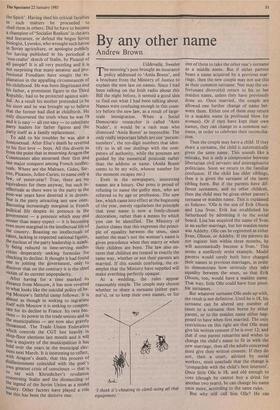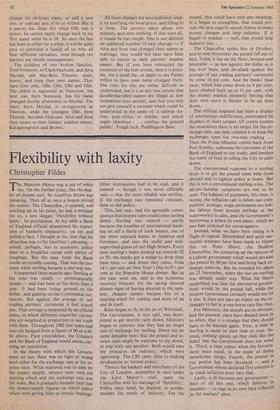By any other name
Andrew Brown
Uddevalla, Sweden The morning's post brought an insurance policy addressed to `Amla Bomn', and a brochure from the Ministry of Justice to explain the new law on names. Since I had been talking on the Irish radio about this Bill the night before, it seemed a good idea to find out what I had been talking about. Names were confusing enough in this coun- try before the new law, as a result of large- scale immigration. When a Social Democratic researcher is called 'Ants Nuder', it would be a rash man who dismissed `Amla Bomn' as impossible. The only really important labels are our 'person- numbers', the ten-digit numbers that iden- tify us in all our dealings with the com- puters of authority, while the postmen are guided by the numerical postcode rather than the address or name. (Amla Bomn seems to be my wife, whoose number for the moment escapes me.)
Even in the newspapers, interesting names are a luxury. Our press is proud of refusing to name the guilty men, who are referred to by age or profession. The new law, which came into effect at the beginning of the year, merely regularises the principle that your name is now a freely-chosen decoration, rather than a means by which you can be identified. The Ministry of Justice claims that this expresses the princi- ple of equality between the sexes, since neither the man's nor the woman's name is given precedence when they marry or when their children are born. The law also en- sures that children are treated in exactly the same way, whether or not their parents are married. If this sounds confusing, the ex- amples that the Ministry have supplied will make everthing perfectly opaque.
At a wedding, the rules appear reasonably simple. The couple may choose whether to share a surname (either part- ner's), or to keep their own names, or for 'I think it's cheating to climb using all that equipment.' one of them to take the other one's surname as a middle name. But if either partner bears a name acquired by a previous mar- riage, then the new couple may not use this as their common surname. Nor may the un- fortunate divorce(e) return to his or her maiden name, unless they have previously done so. Once married, the couple are allowed one further change of name bet- ween them. Either one of them may return to a maiden name (a profound blow for women). Or if they have kept their own names, they can change to a common sur- name, in order to celebrate their reconcilia- tion.
Then the couple may have a child. If they share a surname, the child is automatically given the same name. This sounds like a mistake, but is only a compromise between libertarian civil servants and unimaginative politicians. Soon we return to the familiar confusion. If the child has elder siblings, then it is given the surname of the latest sibling born. But if the parents have dif- ferent surnames, and no other children, then the child may be given either parent's surname or maiden name. This is explained as follows: '011e is the son of Erik Olsson and Lisa Svan. Erik has established his fatherhood by admitting it to the social board. Lisa has acquired the name of Svan in an earlier marriage, but her maiden name was Addeby. 011e can be registered as either Swan, Olsson, or Addeby. If the parents do not register him within three months, he will automatically become a Svan.' This seems a needlessly sexist example. Model parents would surely both have changed their names in previous marriages, in order to demonstrate how seriously they take equality between the sexes, so that Erik Olsson, too, would have a maiden name. That way, little 011e could have four possi- ble surnames.
But whatever surname 011e ends up with, the result is not definitive. Until he is 18, his surname can be altered any number of times to a surname then borne by either parent, or to the maiden name either hap- pened to have when first married. The only restrictions on this right are that 011e must give his written consent if he is over 12; and that if one parent remarries and wishes to change the child's name to fit in with the new marriage, then all the adults concerned must give their written consent. If they do not, then a court, advised by social workers, must conclude that the change is 'compatible with the child's best interests'. Once little 011e is 18, and old enough to vote (though he cannot buy a drink for another two years), he can change his name once more, according to the same rules.
But why still call him 011e? He can change his christian name, or add a new one, or subtract one, if he so wishes. But if a parent has done this when 011e was a minor, he cannot easily change back to his first name when he is 18. So once the law has been in effect for a while, it will be quite easy to construct a family of six who all bear different surnames, even though the parents are wholly monogamous:
The children of two broken families, Sven Svensson, ne Clark Olafsson, and Alva Myrdal, nee Maj-Britt Theorin, meet, marry, and keep their own names. They have four sons, 011e, 011e, 011e and 011e. The eldest is registered as Svensson, the next son, born Svensson, has his name changed shortly afterwards to Myrdal. The third, born Myrdal, is re-registered as Theorin, while the youngest 011e, born Theorin, becomes Olafsson. Alva and Sven then return to their fathers' maiden names, Karageorgevich and Brown.
All these changes are accomplished simp- ly by notifying the local priest, and filling in a form. The process takes about two minutes, and costs nothing. If that were all, it would be too simple. One is not allowed an unlimited number of easy changes — if Alva and Sven had changed their names at marriage, they would not later have been able to return to their parents' maiden names. But if you have exhausted the resources of the free system, then it is possi- ble, for a small fee, to apply to the Patent Office to have your name changed there. The rules for this are rather difficult to understand, but it is at any rate certain that double-barrelled names are illegal as new formations (too untidy), and that you may not give yourself a surname which could be understood as the name of 'a railway sta- tion, post-office, or similar, and which might therefore . . . confuse the general public'. Tough luck, Paddington Bear.







































 Previous page
Previous page